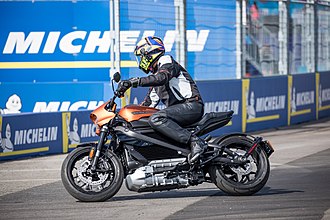
Revolutionizing Racing with Electric Power
Ducati, renowned for its exceptional street bikes and racing success, is making its mark in the world of electric motorcycles with the revolutionary Ducati MotoE. While electric power has proven itself in the automotive realm, translating that success to the realm of motorcycles has proven to be a greater challenge. The Ducati MotoE, developed for the single-make MotoE World Championship, is generating excitement for its exceptional performance, but it’s still a while before such technology trickles down to production models.
Aiming High: Ducati’s Electrifying Journey
Ducati, a name synonymous with luxury and speed, has taken the electric plunge by creating the MotoE electric motorcycle. Led by Roberto Canè, the company’s eMobility director, Ducati’s venture into electric motorcycles has been met with praise and high expectations. Despite already dominating the traditional motorcycle racing scene, Ducati aims to pave the way for electric motorcycles when the technology matures through View Performance Parts.
A Racer’s Pedigree: Ducati’s Motorsport Success
Compared to industry giants like Honda, Ducati is relatively small, but its partnership with Dorna, the commercial rights holder of MotoGP, has propelled it into the spotlight of electric motorcycle racing. Dorna has chosen Ducati as the exclusive supplier for its fledgling MotoE World Championship, securing both visibility and financial support for Ducati’s electric racing prototypes.
MotoE: Where Innovation Meets Racing
MotoE, a championship for electric motorcycles, echoes the successful Formula E championship for cars, drawing parallels between the two racing domains. Unlike Formula E, MotoE operates as a support class during MotoGP events, enhancing its visibility and importance. Ducati’s involvement as a key supplier for MotoE marks a significant stride towards advancing electric motorcycle technology.
Balancing Act: Weight vs. Power in Electric Motorcycles
Ducati faced a crucial decision in crafting the MotoE bike: should they prioritize power or weight? The challenge of electric motorcycles lies in the energy density and weight of batteries. Ducati chose a lightweight design, optimizing battery cell placement to ensure both performance and rideability. The battery pack’s integration as a stressed part of the chassis showcases Ducati’s commitment to engineering excellence.
Battery and Chassis Integration: A Game-Changing Approach
The heart of the Ducati MotoE is its battery, cleverly integrated into the chassis structure. This integration not only optimizes weight distribution but also contributes to the bike’s structural rigidity. The lithium-ion cells, configured in a unique layout, offer a balance between weight and performance. This innovative approach sets the MotoE apart from its predecessors.
Unleashing Power: The Heart of the Ducati MotoE
Generating a whopping 150 horsepower from a motor resembling a coffee can, the Ducati MotoE defies expectations. The motor’s power is harnessed through a purpose-built battery that also acts as the bike’s main structure. This integration, while minimizing weight, poses a challenge in maintaining structural integrity and safety. Ducati’s attention to detail ensures a potent yet reliable electric racing machine.
Sculpting Speed: Performance and Aerodynamics
The Ducati MotoE’s astounding acceleration and top speed have left enthusiasts and riders alike in awe. With a focus on lightweight construction, aerodynamics, and advanced technology, the MotoE prototype achieves acceleration that rivals its MotoGP counterparts. The electric motor’s immediate torque delivery sets it apart, providing an unparalleled racing experience.
Charging Ahead: Recharging and Efficiency
In the dynamic realm of electric motorcycle racing, efficiency isn’t just a goal—it’s a crucial factor that can make or break a race. Ducati understands this imperative well and has meticulously designed the recharging and efficiency aspects of its groundbreaking creation, the Ducati MotoE.
The Swift Recharge Process
One of the standout features of the Ducati MotoE is its swift recharging process. Leveraging a unique dual cooling system, the bike’s battery is primed for a quick turnaround between races. After pushing the limits on the track, having a battery that can be efficiently replenished is essential. The dual cooling system not only enhances the battery’s lifespan but also contributes to maintaining its optimal charging capabilities.
Dynamic Charging Infrastructure
Ducati has taken a comprehensive approach to recharging by integrating both static and mobile chargers into its strategy. This dual-pronged approach ensures that the MotoE bikes are always poised to deliver their maximum potential on the starting grid. Static chargers installed in each pit garage provide a reliable and controlled method of recharging. On the other hand, mobile chargers equipped with their own internal batteries offer unparalleled flexibility, allowing the bikes to be charged even when they are positioned on the grid, awaiting the green light.
Uninterrupted Performance
With the commitment to efficiency deeply ingrained, Ducati ensures that the recharging process doesn’t impede the racing schedule. Unlike traditional warm-up laps that racers perform to prepare their machines, MotoE races lack this luxury. Every ounce of power counts, and the entire battery charge needs to be dedicated to racing. The presence of both static and mobile chargers guarantees that the bikes can be charged quickly between races without hindering the tight race schedules.
Efficiency Beyond the Pit Lane
The dedication to efficiency doesn’t stop at the recharging process—it extends to the design and layout of the racing circuit itself. The Ducati MotoE, designed for high-performance electric racing, aligns perfectly with the notion of efficiency. The electric powertrain’s instant torque delivery, coupled with the careful balance between weight and performance, translates to an overall streamlined performance. This efficiency not only enhances the bike’s speed and handling on the track but also optimizes its energy consumption.
A Glimpse into the Future
Ducati’s emphasis on efficiency in recharging and performance exemplifies its forward-looking approach to electric motorcycle racing. By tackling the challenges associated with quick recharging, Ducati sets a precedent for other manufacturers to follow. The integration of static and mobile charging stations paves the way for innovative solutions that cater to the unique demands of electric racing.
In conclusion, the recharging and efficiency aspects of the Ducati MotoE not only reflect Ducati’s commitment to pushing the boundaries of electric motorcycle racing but also showcase its dedication to the continuous improvement of electric vehicle technology. As the world of electric racing evolves, these advancements will undoubtedly play a pivotal role in shaping the future landscape of both electric motorcycles and motorsport as a whole.
The Road Ahead: Challenges and Future Prospects
While the Ducati MotoE showcases impressive electric racing technology, translating this to consumer-grade electric motorcycles remains a challenge. Ducati acknowledges that advancements in battery technology are needed for “big displacement” electric motorcycles to become a reality. Solid-state cells and other emerging technologies hold promise, but it will take time before electric motorcycles with exceptional energy density and performance become accessible to the masses.
Write and Win: Participate in Creative writing Contest & International Essay Contest and win fabulous prizes.


